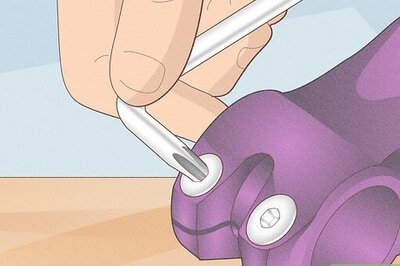
views
How to Clean Solar Panels Manually
Determine if you can clean the panels from the ground. For your safety, it’s best to clean solar panels from the ground if possible, but in some cases, it may be necessary to climb to the roof. If this is the case, have someone with you to hold an extension ladder stable, and be sure you can climb to the roof safely. Use a safety harness, as well. If possible, get a long-handled roof brush so you can clean your panels from the ground.
Turn off the solar panel system. For your safety and to protect your solar panels, be sure to turn them off before attempting to clean them. If you’re not sure where to turn the panels off, consult your owner’s manual.
Spray the panels with a hose. Knock off any loose dirt and debris, then use a garden hose with a spray attachment to rinse the solar panels and surrounding roof. This will loosen the grime and make it easier to scrub the panels clean. If you have to climb to the roof for this, make sure someone is holding the ladder steady. Do not attempt if you’re alone. If the panels are hot, do not spray them with cold water, as this could cause them to crack. Wait to wash them when they’ve cooled down or use warm water instead. Do not use a pressure washer, as this can damage the solar panels.
Scrub the solar panels with a cleaning solution. In general, a mixture of water and mild detergent works well, though you can also use 1 part vinegar and 8 parts water or a solar panel cleaning solution. Use your long-handled roof brush (or a soft-bristle brush or sponge if you’re on the roof) to apply the solution to a small section of the panels. Let the solution sit for a few minutes to break up the grime, then gently scrub it away. Repeat with each section until the solar panels are entirely clean. Do not use harsh chemicals, like bleach, as they can damage the solar panels and harm nearby wildlife. Coarse scrub brushes can also scratch and harm the panels. It’s best to work in small sections at a time so the solution doesn’t have time to dry on the panels. If you’re on a ladder and can’t reach the panels, try wrapping a towel around a squeegee on an extension pole. Keep your feet flat on the ladder and do not lean over to try to reach the panels. Another option is to apply the cleaning solution to the panels using a gallon sprayer.
Rinse the solution off, then dry the panels. Grab your hose with a spray attachment to rinse the panels again. Make sure all the cleaning solution comes off, as soap residue can make the solar panels less effective. Then, use a squeegee to dry the panels before you turn them back on. Don’t worry too much about drying the panels completely; since they’re in the sun, they’ll dry naturally.
Other Ways to Clean Solar Panels
Soap-free solar panel cleaning brushes If using soap seems like too much of a hassle and you’re worried about a residue being left on the panels, a specialized solar panel cleaning brush may be the option for you. Wash your panels the same way you would with a cleaning solution without having to worry about rinsing the panels off. Pros: Won’t leave behind a soap residue, eco-friendly Cons: May not be as effective at cleaning stubborn grime
Automated cleaning systems If you don’t want to clean your solar panels manually and are willing to invest a bit of money, consider using an automated cleaning system, like robotic cleaners, a sprinkler system, or electrostatic cleaning. These work great for large installations, though robotic systems are typically unnecessary for the average homeowner. Pros: efficient cleaning, no manual labor Cons: high initial cost, may need external power source
Waterless vibration cleaner If you’re looking to save water, look into using a waterless vibration cleaner on your solar panels. These cleaners use sonic vibrations to dislodge dirt and debris without you having to manually wash your panels. Pros: effective cleaning, saves water Cons: Expensive, limited availability
When to Clean Solar Panels
Clean your solar panels once or twice a year in general. There isn’t an exact timeframe in which you should clean your solar panels. Typically, clean them anytime you notice a drop in energy consistency or when there’s visible dirt or dust build-up. However, there are other factors that can help you determine how often to clean your solar panels: Geographic location: Rain can naturally rinse off your solar panels, so if you live in a wetter climate, you likely won’t have to clean them as much. If you live in a dry climate, however, you may need to clean them more often. Landscaping: Generally, solar panels are placed somewhere with clear access to the sun. If you have trees nearby, however, pollen, leaves, and other debris may end up on the panels, meaning they’ll need to be cleaned more often. Roof pitch: If your roof has a steep pitch, they’ll likely need to be cleaned less often than roofs with low pitches, as debris can slide off and is less likely to get stuck. Consider the weather and your personal safety as well. For example, if it’s extremely hot outside, cleaning solar panels with cold water could actually damage them, or if it’s slick or wet outside, you could hurt yourself in the process. Solar panel specialist Guy Gabay says it’s only necessary to clean solar panels if they’re visibly dirty: “If you're in an area that has a lot of dust, pollen, let's say sandstorms, or if there's a fire, it's recommended to wash them off. Washing them off with the hose is sufficient if you notice any sort of thick layer of dust, pollen, dander, or ashes. Other than that, they're virtually maintenance free, and they [often] come with a 25 year warranty.”
When to Call a Professional
Call a pro if you can’t or don’t want to clean the panels yourself. Cleaning solar panels is pretty straightforward, but there are several reasons you may not clean them yourself, including safety concerns, physical limitations, or time constraints. On average, it costs $25 per solar panel for a professional cleaning, or $150 for a cleaning and inspection bundle. Depending on what you already own, it may cost around $100 to get the equipment to clean the panels yourself. In this case, it may be easier and more efficient to hire a professional.
Why Solar Panels Need to Be Cleaned
Solar panels aren’t as effective if they’re covered in grime. Solar panels consist of photovoltaic cells that absorb the sun’s rays to convert sunlight into usable energy. In order to fully absorb the sunlight, the cells cannot be blocked by debris or grime, which is why it’s important to keep solar panels clean. According to the National Renewable Energy Laboratory, the presence of dust, soot, and other grime can decrease solar panels’ efficiency by 7%.
Cleaning Solar Panels FAQs
How long does it take to clean solar panels? The exact time it takes to clean solar panels varies depending on a number of factors, like how many solar panels you have, the cleaning method you use, and whether or not you have someone to help you. On average, though, expect to spend about 1 to 2 hours.
Is it okay to pressure wash solar panels? No, it’s best to avoid pressure washing solar panels. Pressure washing can scratch or damage the photovoltaic cells, and high water pressure can damage the seal around the frame, allowing water to get inside the panels.
Can I use Dawn dish soap to clean my solar panels? Yes, Dawn dish soap is a safe cleaning solution for solar panels, as it’s gentle, effective, and biodegradable. Mix some with water, gently scrub the solar panels, then rinse thoroughly to ensure all soap residue is removed.
What is the best thing to clean solar panels with? It’s typically best to use a long-handled roof brush, soft-bristle brushes, and plastic-blade squeegees to clean solar panels, as they’re gentle and won’t scratch or damage the panels. Attach shorter brushes or squeegees to a long pole for hard-to-reach areas.
Can I just rinse my solar panels? Rinsing your solar panels alone can remove loose dirt and debris, but it likely won’t remove stubborn grime. Rinsing can serve as good maintenance between deeper cleanings, but to thoroughly clean your solar panels, you’ll probably need a brush or sponge and a gentle cleaning solution.
Can I use Windex or bleach on my solar panels? Avoid using harsh chemicals like bleach, Windex, or ammonia cleaners on your solar panels. Windex and ammonia cleaners can leave residues that affect the panels’ performance, and bleach and other harsh chemicals can damage solar cells and reduce efficiency.




















Comments
0 comment